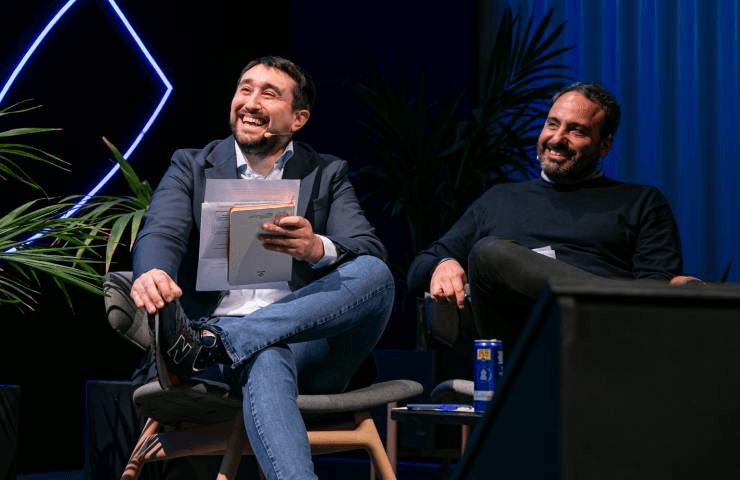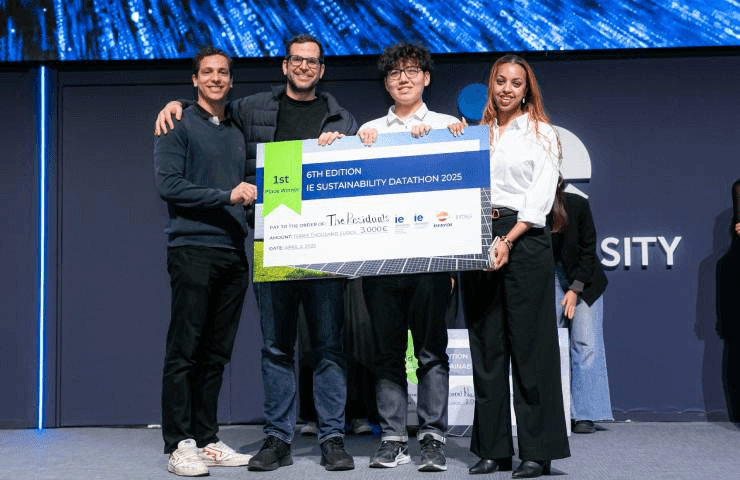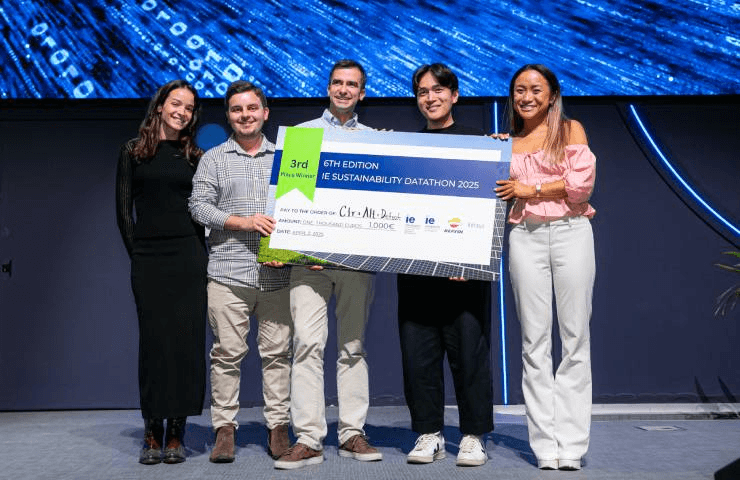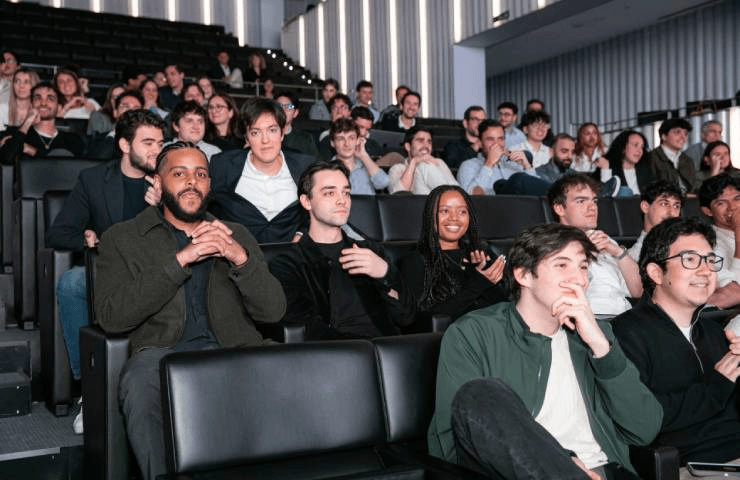- Home
- News And Events
- News
- Ie Sustainability Datathon Concludes With Dynamic Competition
IE Sustainability Datathon concludes with dynamic competition
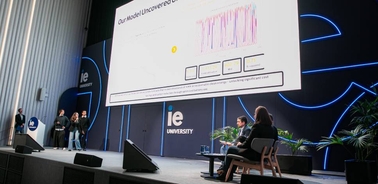
Top students compete in Repsol’s sustainable-energy challenge.
This April, the sixth edition of the IE Sustainability Datathon successfully concluded at the IE Tower Auditorium in Madrid. The closing ceremony brought budding data scientists together to solve real-world sustainability problems—offering a fitting showcase for the talent at IE School of Science & Technology. Participants competed for prize money totaling €6,000—€3,000 for first place, €2,000 for second and €1,000 for third. This year, all members of placing teams were students of the Master in Business Analytics & Data Science.
This year's Datathon was delivered in partnership with Repsol Digital and Infosys. Repsol, a global multi-energy company, is committed to achieving net zero emissions by 2050—an ambitious objective that aligns with the Paris Agreement. Infosys is a leader in next-generation digital services and consulting, with a commitment to sustainability and inclusivity.
First place was awarded to The Residuals, which comprised Fatine Samodi, Haniy Banti, Hector Marmol, Yihang Li and Santiago Botero. Using Python and tools like Pandas, Matplotlib, Scikit-learn, and Seaborn, they built a predictive model to estimate solar generation potential. They then simulated battery storage behavior under realistic constraints to maximize solar self-consumption and reduce dependence on grid electricity—particularly during periods of high carbon intensity. Their solution also incorporated environmental analysis using CO₂ intensity data to quantify emissions avoided.
The judges praised The Residuals’ ability to blend technical precision with business relevance. Repsol sought a solution that was not only accurate, but also scalable, replicable and clearly aligned with their operational and sustainability goals. This is where the team’s academic backgrounds set them apart.
"We’re incredibly grateful to IE School of Science and Technology for fostering experiences like this where academic learning meets real-world impact," says Haniy Banti. "This challenge gave us the confidence and clarity to see how what we’re learning today can help solve the most urgent problems of tomorrow."
Haniy also cited the university’s practical teaching philosophy as being core to their success: "We applied principles from our Digital Marketing and Data Visualization classes to design a final presentation that was compelling—right down to using Repsol’s brand colors and visual identity for impact and resonance. It’s also worth noting that two of our team members—Santiago Botero and myself, Haniy Banti—hold MBAs from IE Business School. This blend of business insight and data science expertise allowed us to apply not just technical skills, but also strategic thinking, systems analysis, and operational understanding capabilities we developed across both programs."
Second place went to Neural Navigators: Maria Vazquez Pinedo, Sarina Ratnabhas, Samuel Ginzburg, Omar Harradi, Joshua Vanderspuy and Edwin Blanco. Their project sought similar goals, differentiating in their development of a forecasting model based on key solar output drivers using a ConvLSTM neural network that analyzed 72 hours of weather data across three locations. Via strategic charging and discharging logic, they achieved a solar utilization score of 93% that indicated efficient energy capture and reduction in grid reliance. Projections suggested that scaling this strategy across Repsol’s industrial assets could eliminate up to 66% of associated emissions from solar-generated energy.
Third place was taken by Ctr + Alt + Defeat: Joel James Alarde, Uxia Lojo Miranda, Joy Zhong, Emiliano Puertas Ajuria and Maria do Carmo Vieira da Fonseca de Brito e Abreu. Ctrl + Alt + Defeat highlighted desynchronization between energy production and consumption, which leads to significant wastage of wind energy and underutilization of solar energy in industries equipped with photovoltaic self-consumption systems.
Their solution simulated a 100 kWh battery with a 100 kW charge/discharge rate, designed to draw from excess solar energy during the day and discharge during peak grid demand, operating independently from the grid. The project's conclusions pointed to strong gains in sustainability and accuracy, noting that reliance on historical weather forecasts was identified a limitation and suggesting potential improvements like real-time updates and adaptive strategies like reinforcement learning.
The event featured students from the Master in Business Analytics & Data Science, Master in Management, Bachelor in Data & Business Analytics and Bachelor in Computer Science & Artificial Intelligence. All were given access to exclusive resources, mentoring sessions and insightful webinars.
Outstanding faculty members of IE School of Science & Technology were also on-hand to share their insights with the attendees. Speakers included: Ikhlaq Sidhu, Dean; Juan Capeáns, Sustainable Transition Hub Director; Raquel Cabero, Academic & Program Director; and Guillermo de Haro, Vice Dean. Special thanks must go to Eduardo Martin Fernandez-Pacheco, founder of the IE Sustainability Datathon; Elisa Ruiz Martinez, director of the competition; and Juan Jose Casado, Chief Digital & Data at Repsol and friend of IE University.
This year’s Datathon once again demonstrated the power of data in shaping a sustainable future. Key findings are being compiled into a visioning report, which will be shared with experts and policymakers.
As IE University seeks to foster positive change in higher education, it also works to inspire the brilliant minds that will influence the future of sustainability in business. In doing so, the Datathon celebrates another year of growing impact.
